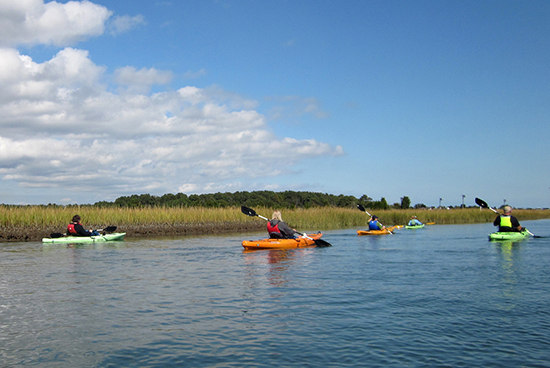Our Chesapeake Agenda
Molly Ward, Virginia Secretary of Natural Resources, describes the current and future work needed for Bay restoration

On June 16, 2014, the Chesapeake Executive Council signed the historic Chesapeake Bay Watershed Agreement, charting the future course for the multi-state and federal partnership known as the Chesapeake Bay Program.
Governor Terry McAuliffe assumed the chairmanship of the Chesapeake Executive Council, the Bay Program’s top leadership body, on January 1st of this year, and on July 23, 2015, he chaired his first meeting. This meeting focused on specific actions that will further our collective efforts to restore the Bay, from increasing the amount of forested stream corridors, excluding livestock from streams, advancing critical land conservation needs and working to increase the funding available for restoration.
Experts, scientists, agency staff and non-profits collaboratively developed the management strategies for meeting the goals and outcomes in the Chesapeake Bay Watershed Agreement. These strategies, presented to the Executive Council at the July 23rd meeting, go far beyond water quality improvement, addressing issues from land conservation and fisheries management to environmental literacy and climate change.
The ongoing efforts to protect and restore the Chesapeake Bay are at a critical point. The deadline called for in the Chesapeake Bay TMDL for 60 percent of nutrient and sediment reductions by 2017 is fast approaching. The more difficult task of meeting our pollution reduction commitments by 2025 will take continued progress across the entire range of nutrient and sediment sources.
Each of the six states in the Chesapeake Bay watershed, along with the District of Columbia, the Chesapeake Bay Commission and the federal government represented by EPA, are responsible for meeting our collective goals. As the “downstream” state in the watershed, we in Virginia depend on our neighbors to the north and west to achieve healthy waters and the benefits that come from a clean Bay. Our neighbors will also benefit from cleaner water and more abundant fisheries and wildlife in their rivers and streams. Whether you are in Cooperstown, New York, or in Hampton, Virginia, we are all in this together.

Clean water, healthy stream corridors and the related habitat and ecological benefits make our counties, cities and towns more livable and more attractive to prospective employers, and they support our traditional industries such as agriculture, forestry, tourism and fishing, which in turn support jobs and serve our goals of a vibrant and sustainable economy.
All Bay Program partners are now fully engaged in the implementation of the management strategies. As partners, we will continue the progress we have made in meeting our water quality goals and seek the continued cooperation of key urban and agriculture sectors. We will work to bring new resources, including private and federal, to meet the costs of implementation and progress. We will be open and public about our science-based decisions and the rationale for making them. We will reach out to all sectors, public and private, to ensure that regulatory obligations are fulfilled and voluntary efforts are supported and valued.
Although we may face significant challenges in such a large and developing watershed, the payoff in terms of environmental health and economic prosperity will be enormous, and it will benefit ours and future generations.
Written by Molly Joseph Ward, Secretary of Natural Resources, Commonwealth of Virginia. Ward is chair of the Chesapeake Bay Program's Principals' Staff Committee.

Comments
There are no comments.
Thank you!
Your comment has been received. Before it can be published, the comment will be reviewed by our team to ensure it adheres with our rules of engagement.
Back to recent stories